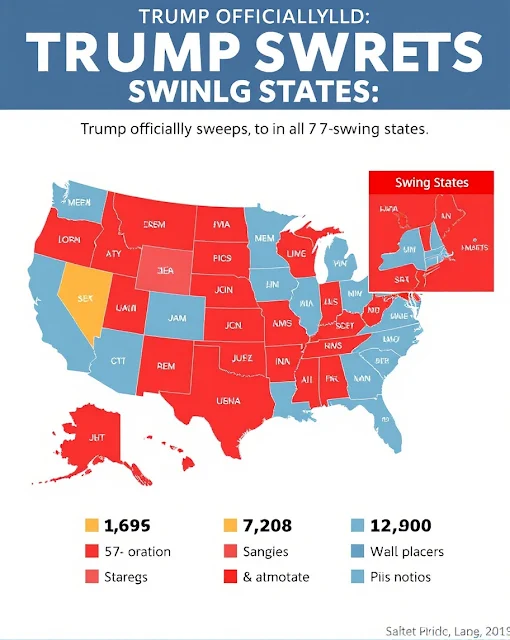President-elect Donald Trump has officially secured victory in all seven critical swing states in the 2024 election, according to the Associated Press.
Key Takeaways:
Trump's sweeping win delivered him 312 electoral votes, making him the first Republican candidate in two decades to also win the popular vote. This marks a significant moment for the GOP, positioning Trump's MAGA movement as a dominant force, especially if Republicans secure both the House and Senate.
Arizona was the final swing state to be declared, cementing Trump's victory after he had already reached the necessary Electoral College threshold. The Associated Press called the state on Saturday night.
State of Play:
While battleground states can shift with each election cycle, a clean sweep like this is rare. In 2020, President Joe Biden won key states such as Pennsylvania, Georgia, Michigan, Arizona, and Wisconsin — all of which Trump had previously carried in 2016. Trump managed to win only North Carolina in 2020. This year, however, he reclaimed all these states and added Nevada, which had been held by Democrats for two decades.
In 2008, Barack Obama had a similar performance, winning nearly every battleground state, narrowly losing only Missouri. Obama also secured Florida twice, a state now considered solidly Republican.
Notably, in 1984, Ronald Reagan achieved one of the most commanding sweeps in history, winning every state except Minnesota and Washington, D.C., setting a record for the highest Electoral College count in modern American history. Reagan defeated Walter Mondale, who had the first female vice-presidential candidate on a major party ticket, Geraldine Ferraro. Following Reagan's sweep, George H.W. Bush also secured a significant victory in 1988 but lost the then-battleground state of New York, which hasn't voted Republican since.
Zooming Out:
In recent elections, Democrats had won the popular vote consistently over the last four cycles. In 2016, Trump lost the popular vote to Hillary Clinton by about 2.9 million but clinched the Electoral College through key battleground states. Before that, George W. Bush was the last Republican to win the popular vote in 2004, the first since his father, George H.W. Bush, in 1988.
This year, even traditionally Democratic states saw a shift to the right, with Republicans making gains among key demographics, including Black and Latino men, young voters, and independents.
Trump's Reaction:
In a victory speech from West Palm Beach on Wednesday morning, Trump called his win the "greatest political movement we've ever seen." His return to the presidency makes him only the second president in U.S. history to win two non-consecutive terms. The first was Grover Cleveland, who served as the 22nd and 24th president. Cleveland initially won in 1884, lost his re-election bid in 1888, and then reclaimed the presidency in 1892, winning both the electoral and popular vote.


















0 Comments